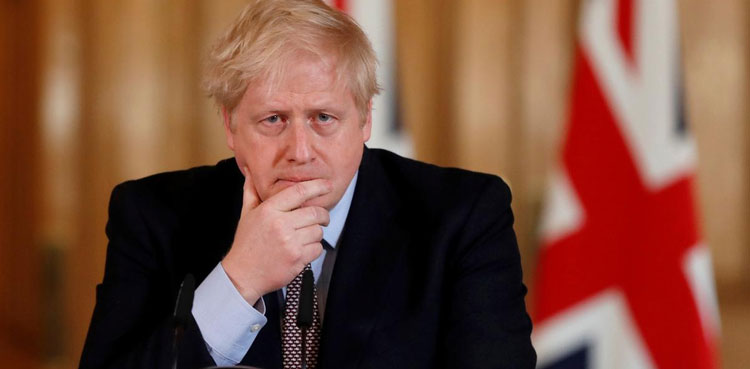
LONDON: Campaigners for the welfare of elderly people and their relatives are calling on the UK government to be more transparent after authorities declined to disclose the number of COVID-19 deaths in individual care homes.
Citing the need to protect privacy and to avoid “creating confusion,” among other reasons, the agencies that separately regulate care homes in England, Wales, Scotland and Northern Ireland each rejected requests by Reuters that they disclose the death tolls at specific facilities.
Across the United Kingdom, thousands of people have died in care homes after becoming infected with the coronavirus, according to the government’s own statistics. Advocacy groups that run helplines for families of care home residents say callers are desperate for more information about where outbreaks have occurred. But they say they aren’t getting it.
“This lack of transparency is a problem for all sorts of reasons,” said Ruthe Isden, health and care influencing director at Age UK, an advocate for the elderly. “It’s very hard to get a handle on what’s going on in care homes.”
Helen Wildbore, director of the Relatives & Residents Association, a national charity supporting families of people in residential care, told Reuters that ensuring open communication between care homes and families “will help to allay any fears and ensure there isn’t an information gap which causes unnecessary anxiety.”
A Reuters investigation last week detailed how the government’s focus on shielding hospitals, to prevent emergency wards from being overwhelmed, left care home residents and staff exposed to COVID-19. To free up hospital beds, patients were discharged into homes for the elderly and vulnerable, often without being tested for the coronavirus that causes the disease.
When Reuters asked for details of deaths in three homes badly hit by the virus in the London borough of Enfield, officials at the Care Quality Commission (CQC), which regulates care homes in England, said they could not disclose the data from any individual establishment.
“This has nothing to do with protecting the reputation of the providers concerned, but is about protecting the privacy and confidentiality of those who have died and their families,” CQC spokesperson Kirstin Hannaford wrote in an email to Reuters.
Scotland’s regulator, the Care Inspectorate, said it too would not provide site-level data to Reuters.
Regulators in Wales and Northern Ireland also declined to provide similar information.
The UK’s opposition Labour Party endorsed the calls for publishing the data. A shadow care minister, Liz Kendall, said more disclosure from the CQC “is crucial in tackling the spread of the virus in care homes.”
“Families and the wider public must know when and where outbreaks of coronavirus are happening,” she told Reuters. “This information is crucial in ensuring care homes are given the resources, support and attention they need to stop the spread of this awful virus.”
Authorities have documented nearly 10,000 deaths in care homes across the United Kingdom linked to the novel coronavirus through May 1, but the toll is likely much higher. A Reuters data analysis estimated a higher toll.
Drawing on official statistics, Reuters compared the total number of care home deaths in the eight weeks to May 1 with historical averages. The figures showed at least 20,000 excess deaths in care homes in England and Wales during the pandemic.
Pressed by opposition Labour leader Keir Starmer on Wednesday about the high number of deaths in care homes, Prime Minister Boris Johnson told parliament: “Now, I am not going to try to pretend to the House that the figures, when they are finally confirmed, are anything other than stark and deeply, deeply horrifying. This has been an appalling epidemic.”
Some care homes were hit particularly hard, Reuters found. In Enfield, a north London borough of 334,000 people, outbreaks had occurred in at least 42 out of 82 care homes by April 24. By April 30, at least 136 deaths were linked to the virus in Enfield care homes, including residents who died in hospital.
The Care Quality Commission, or CQC, requires care home operators to notify the agency of deaths and has asked them to describe which deaths are suspected of being linked to the coronavirus. The agency has been releasing breakdowns by area. This data doesn’t show disparities between care homes, nor where outbreaks have occurred.
When Reuters pressed the agency last week to release more detailed information under the UK’s Freedom of Information Act, an official declined the request, on the grounds that care home operators have a reasonable expectation of confidentiality and wouldn’t properly notify authorities of deaths – as the law requires – if they knew the information could be made public.
Simon Richardson, an information rights manager at the CQC, said that telling the public how many people have died, and where, “risks creating confusion as to the prevalence, spread or impact of the virus at this time.” Releasing such information, he told Reuters in a letter explaining his decision, would “likely to impede the national effort to deal with the pandemic, and therefore to create a significant risk to public health.”
The public interest in disclosure of the information is “outweighed by the public interest in ensuring that the clear, authoritative and comprehensive statistics being produced by the Office for National Statistics aren’t confused or clouded, and in preventing the additional deaths that are likely to arise if the production of those figures is undermined,” Richardson wrote to Reuters.
Emma Jones, a human rights solicitor and partner at law firm Leigh Day, said the commission is adopting a “very patriarchal stance.”
“I don’t know whether the reasons they are giving for not providing the information would withstand a legal challenge.”
MD Mujeeb Subhan News.



Comments
Post a Comment
if you have any doubts. Please let me know